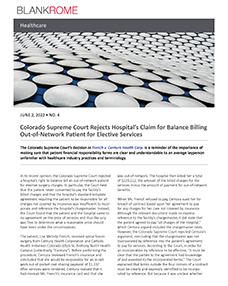Colorado Supreme Court Rejects Hospital’s Claim for Balance Billing Out-of-Network Patient for Elective Services
The Colorado Supreme Court’s decision in French v. Centura Health Corp. is a reminder of the importance of making sure that patient financial responsibility forms are clear and understandable to an average layperson unfamiliar with healthcare industry practices and terminology.
In its recent opinion, the Colorado Supreme Court rejected a hospital’s right to balance bill an out-of-network patient for elective surgery charges. In particular, the Court held that the patient never consented to pay the facility’s billed charges and that the hospital’s standard template agreement requiring the patient to be responsible for all charges not covered by insurance was insufficient to incorporate and reference the hospital’s chargemaster. Instead, the Court found that the patient and the hospital came to no agreement on the price of services and thus the jury was free to determine what a reasonable price should have been under the circumstances.
The patient, Lisa Melody French, received spinal fusion surgery from Centura Health Corporation and Catholic Health Initiatives Colorado d/b/a St. Anthony North Health Campus (collectively, “Centura”). Before performing the procedure, Centura reviewed French’s insurance and concluded that she would be responsible for an in-network out-of-pocket cost-sharing payment of $1,337. After services were rendered, Centura realized that it had misread Ms. French’s insurance card and that she was out-of-network. The hospital then billed her a total of $229,112, the amount of the billed charges for the services minus the amount of payment for out-of-network benefits.
When Ms. French refused to pay, Centura sued her for breach of contract based upon her agreement to pay for any charges for her care not covered by insurance. Although the relevant document made no express reference to the facility’s chargemaster, it did state that the patient agreed to pay “all charges of the Hospital,” which Centura argued included the chargemaster rates. However, the Colorado Supreme Court rejected Centura’s argument, concluding that the chargemaster was not incorporated by reference into the patient’s agreement to pay for services. According to the Court, in order for an incorporation by reference to be effective, “it must be clear that the parties to the agreement had knowledge of and assented to the incorporated terms.” The Court explained that terms outside the four corners of a contract must be clearly and expressly identified to be incorporated by reference. But because it was unclear whether the patient “had knowledge of [or] assented to” paying Centura’s chargemaster rates, it could not be incorporated into the health services agreement (“HSA”) by reference.
In the alternative, Centura argued that the HSA’s reference to “all charges of the Hospital” automatically included the chargemaster because it could not accurately predict in advance all of the services that a patient might need. The Colorado Supreme Court rejected this argument, concluding that Centura already knew about the procedures to be performed on the patient and that the patient’s actual course of treatment did not deviate substantially from the expected course of treatment. The Court further explained that “nothing prevented Centura from providing, at very least, the chargemaster rates for the anticipated procedures.” The Court, therefore, concluded that “all charges of the Hospital” did not refer to the chargemaster.
Finally, Centura argued the patient failed to avail “herself of the resources afforded by the Colorado statutes addressing transparency of hospital pricing.” The Court, however, found this argument unpersuasive, concluding that the statutes placed no burden on the patients, but instead placed the burden on hospitals to disclose facility charges to patients.
As chargemaster rates did not apply to Ms. French’s agreement to pay for her care, the Colorado Supreme Court concluded that there was no price term agreed to between the patient and the hospital. Accordingly, it was appropriate for the fact-finder at trial (here, the jury) to determine what a “reasonable” price for the services would be based upon expert testimony. The court did not, however, explain how the reasonable value of healthcare services should be determined, although it did note that Ms. French’s expert applied a reasonable value measure that was roughly five percent over cost.
In addition to the decision’s reminder of the importance of making sure that patient financial responsibility forms are clear and understandable to an average layperson, the unusual and extreme fact pattern–where the patient was told she would pay a modest in-network cost-share before services were rendered but then was hit with an unexpected bill in excess of $200,000 afterwards–may perhaps have influenced the outcome. This may counsel towards exercising prudence and discretion in choosing which patient balances to pursue aggressively.
For additional information or assistance, contact Barak A. Bassman, Triston Chase O’Savio, or a member of Blank Rome’s Healthcare industry group.


